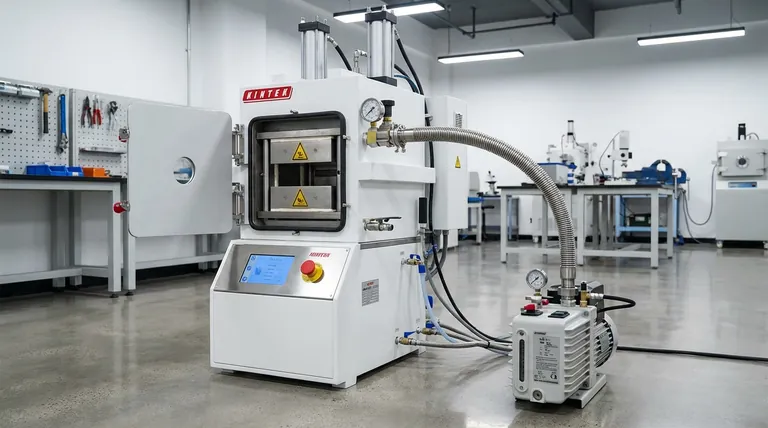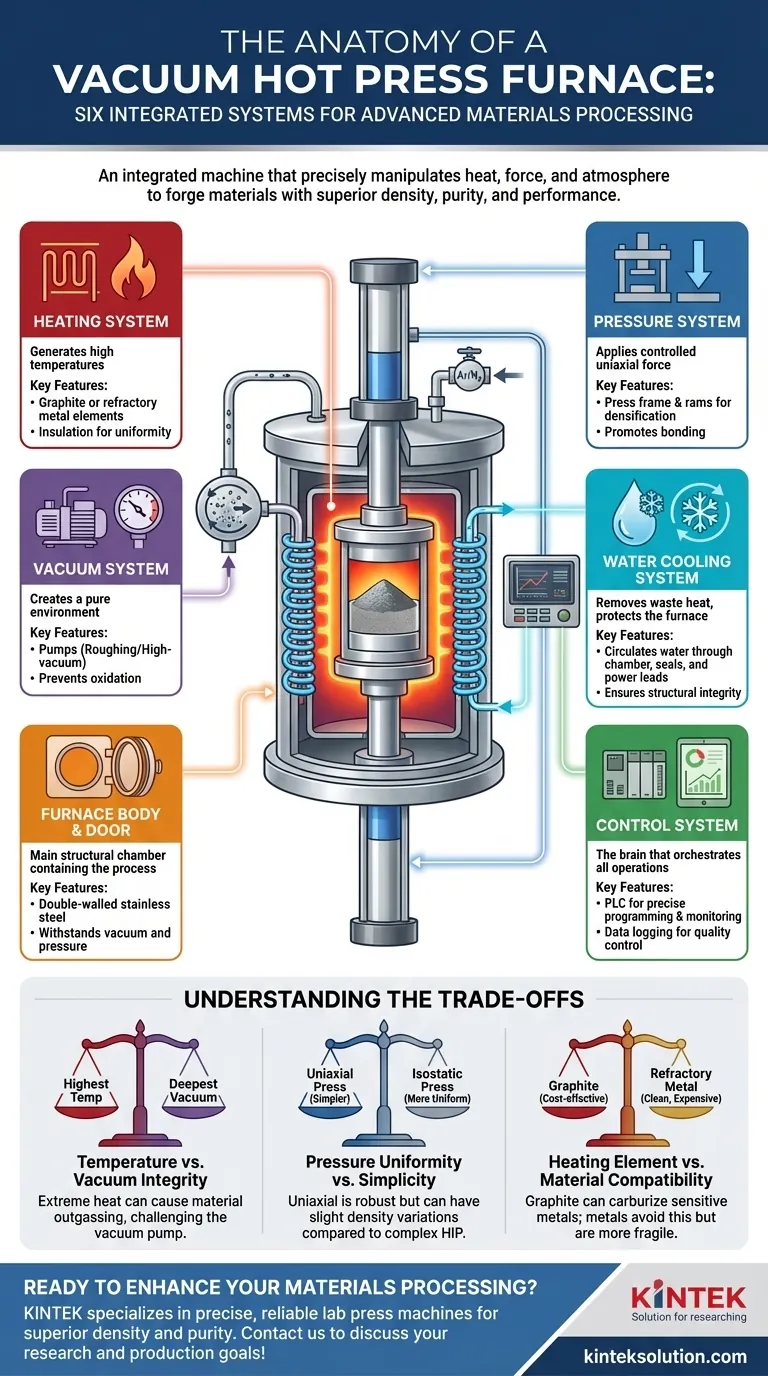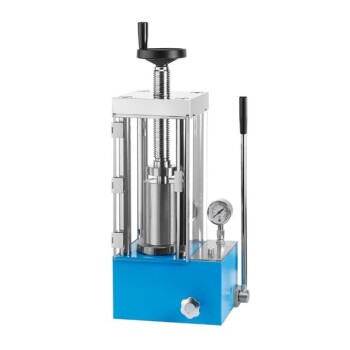At its core, a vacuum hot press furnace is an integrated machine built from six primary systems. These include the furnace body which contains the process, a heating system to achieve high temperatures, a pressure system to apply force, a vacuum system to create a pure atmosphere, a water cooling system for protection, and a control system to orchestrate the entire process. Together, these components allow for advanced materials processing like sintering and diffusion bonding.
A vacuum hot press is more than just a high-temperature oven; it is a sophisticated materials processing tool. Understanding its individual components reveals how it precisely manipulates heat, force, and atmosphere to forge materials with superior density, purity, and performance.

The Core Systems: Containing the Process
A vacuum hot press furnace functions by creating an extremely controlled environment. The integrity of this environment begins with the furnace body and its associated systems.
The Furnace Body and Door
The furnace body is a double-walled, typically stainless steel vessel that serves as the main structural chamber. It is engineered to withstand both the immense external atmospheric pressure when under vacuum and the internal forces applied during operation.
The furnace door provides access to the chamber and features robust seals, such as O-rings, that are critical for achieving and maintaining a high-quality vacuum.
The Heating System
This system is responsible for generating the extreme temperatures required for material processing. It consists of heating elements and insulation.
Heating elements are typically made from graphite or refractory metals like molybdenum or tungsten, chosen based on the maximum required temperature and chemical compatibility with the process atmosphere.
Insulation, often graphite felt or ceramic fiberboard, surrounds the heating zone to minimize heat loss, improve temperature uniformity, and protect the furnace body.
The Active Systems: Manipulating the Material
The "magic" of a hot press happens through the precise application of vacuum, pressure, and heat. These three systems work in concert to transform powdered or solid materials.
The Vacuum System: Creating a Pure Environment
The vacuum system is essential for removing air and other contaminants from the chamber before and during processing. This prevents oxidation and unwanted chemical reactions at high temperatures.
A typical system includes a mechanical "roughing" pump to remove the bulk of the air and a high-vacuum pump (like a diffusion or turbomolecular pump) to achieve lower pressures. Gauges and valves allow for precise monitoring and control of the vacuum level.
The Pressure System: Applying Mechanical Force
This system applies a controlled, uniaxial (single-direction) force onto the material via a press frame and rams. These rams, often made of high-density graphite, extend into the furnace chamber to compress the material within a die.
The applied pressure physically compacts the material, closing porosity and promoting densification and bonding at a microscopic level.
The Gas System: Modifying the Atmosphere
While a vacuum is primary, some processes require a specific atmosphere. The gas or "air charging" system allows for the introduction of a controlled, positive-pressure inert gas like argon or nitrogen.
This is often used to speed up the cooling cycle or to run processes where a complete vacuum is undesirable.
Essential Support and Control
These background systems ensure the furnace operates safely, reliably, and with precision.
The Water Cooling System
High temperatures inside the furnace would quickly destroy the chamber, seals, and power connections. A water cooling system continuously circulates water through passages in the furnace body, door, and power feedthroughs.
This system is not optional; it is a critical safety and operational component that actively removes waste heat and maintains the structural integrity of the entire furnace.
The Control System: The Brain of the Operation
The control system, usually managed by a PLC (Programmable Logic Controller), is the central nervous system of the furnace. It integrates all other components into a cohesive whole.
The operator uses this system to program, monitor, and record critical process parameters like temperature ramps, pressure application, and vacuum levels. Modern systems include sophisticated data logging for quality control and process repeatability.
Understanding the Trade-offs
The performance of a vacuum hot press is a balance between its different systems. Optimizing for one parameter often impacts another.
Temperature vs. Vacuum Integrity
Achieving the highest temperatures can work against achieving the deepest vacuum. At extreme heat, materials within the furnace can "outgas," releasing trapped volatiles that the vacuum pump must continuously remove.
Pressure Uniformity vs. Simplicity
Uniaxial pressing is mechanically straightforward but can sometimes result in slight density variations within a part. More complex and expensive Hot Isostatic Presses (HIP) apply pressure uniformly with gas, but a standard hot press offers a robust and cost-effective solution for many applications.
Heating Element vs. Material Compatibility
Graphite heating elements are a cost-effective workhorse but can carburize certain sensitive metals. Refractory metal heaters avoid this issue but operate best in a vacuum and can be more fragile and expensive.
Making the Right Choice for Your Goal
The ideal furnace configuration depends entirely on your primary processing objective.
- If your primary focus is maximum material density and purity: Prioritize a furnace with a high-performance vacuum system (turbomolecular or diffusion pump) and a precisely controlled pressure system.
- If your primary focus is processing novel high-temperature materials: Your key considerations are the maximum temperature rating, the heating element material, and the capacity of the water cooling system.
- If your primary focus is industrial production and repeatability: Invest in a sophisticated and reliable control system with comprehensive data logging and recipe management features.
By seeing the furnace as an interconnected system, you can move from simply operating the equipment to truly mastering the material outcomes it produces.
Summary Table:
| Component | Function | Key Features |
|---|---|---|
| Furnace Body | Main structural chamber | Double-walled stainless steel, withstands vacuum and pressure |
| Heating System | Generates high temperatures | Graphite or metal elements, insulation for uniformity |
| Pressure System | Applies uniaxial force | Press frame, rams for densification |
| Vacuum System | Creates pure atmosphere | Pumps, gauges, valves to prevent oxidation |
| Water Cooling System | Removes waste heat | Protects chamber, seals, and power connections |
| Control System | Orchestrates operations | PLC for programming, monitoring, data logging |
Ready to enhance your materials processing with a reliable vacuum hot press furnace? KINTEK specializes in lab press machines, including automatic, isostatic, and heated lab presses, tailored for laboratory needs. Our expertise ensures precise temperature control, uniform heating, and robust performance for superior density and purity in your applications. Contact us today to discuss how we can support your research and production goals!
Visual Guide

Related Products
- Heated Hydraulic Press Machine With Heated Plates For Vacuum Box Laboratory Hot Press
- Heated Hydraulic Press Machine with Heated Plates for Vacuum Box Laboratory Hot Press
- Automatic High Temperature Heated Hydraulic Press Machine with Heated Plates for Lab
- Automatic Heated Hydraulic Press Machine with Hot Plates for Laboratory
- Laboratory Manual Heated Hydraulic Press Machine with Hot Plates
People Also Ask
- What role does a heated hydraulic press play in powder compaction? Achieve Precise Material Control for Labs
- What core conditions does a laboratory hydraulic press provide? Optimize Hot-Pressing for 3-Layer Particleboard
- What are the industrial applications of a hydraulic heat press? Powering Lamination, Bonding, and R&D Efficiency
- What is the specific role of the 2-ton pressure in hot-pressing PVDF separators? Ensure Microstructural Integrity for Battery Safety
- What is vacuum hot pressing (VHP) and what is its main purpose? Achieve High-Purity Material Consolidation



















